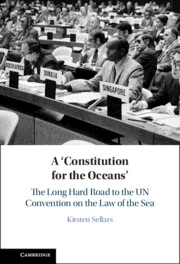Book contents
- A ‘Constitution for the Oceans’
- A ‘Constitution for the Oceans’
- Copyright page
- Contents
- Foreword
- Abbreviations
- 1 End of the Old Order
- 2 Old Freedoms, New Rights
- 3 North, South, East and West
- 4 A Conference Collapses
- 5 Internationalising the Seabed
- 6 Passage through Straits
- 7 The Archipelagic Concept
- 8 New International Orders
- 9 The Bitter End
- Afterword
- Bibliography
- Index
2 - Old Freedoms, New Rights
The Corfu Channel and Fisheries Cases
Published online by Cambridge University Press: 06 February 2025
- A ‘Constitution for the Oceans’
- A ‘Constitution for the Oceans’
- Copyright page
- Contents
- Foreword
- Abbreviations
- 1 End of the Old Order
- 2 Old Freedoms, New Rights
- 3 North, South, East and West
- 4 A Conference Collapses
- 5 Internationalising the Seabed
- 6 Passage through Straits
- 7 The Archipelagic Concept
- 8 New International Orders
- 9 The Bitter End
- Afterword
- Bibliography
- Index
Summary
After the second world war, the International Court of Justice decided two contentious cases: Corfu Channel (1949), which addressed straits used for international navigation; and Fisheries (1951), which considered baselines marking the start of the territorial sea. Both were initiated by the United Kingdom after two other states, Albania and Norway respectively, tried to prevent British vessels from operating without permission in their coastal waters - warships in one case, trawlers in the other. Taken together, the decisions set out the parameters of the modern approach to the law of the sea: preserving the naval powers’ traditional freedoms of navigation while recognising the coastal states’ claims to resources in the waters off their coasts.
Keywords
- Type
- Chapter
- Information
- A ‘Constitution for the Oceans' , pp. 27 - 65Publisher: Cambridge University PressPrint publication year: 2025

